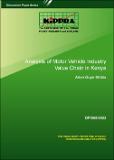| dc.description.abstract | The motor vehicle industry value chain in Kenya is a key focus for employment generation and the growth of the manufacturing sector, aligning with the Third Medium-Term Plan (MTP) of the Kenya Vision 2030 and the Sessional Paper No. 1 of 2022 on National Automotive Policy. However, the industry, particularly in parts and components manufacturing, has faced challenges that hinder its competitiveness along the value chain. This study aims to identify and address the constraints affecting the motor vehicle industry, exploring opportunities in local, regional, and global markets. Constraints exist at all levels of the value chain, including skills development for technological advancements, market uncertainties, and competition from the informal sector dealing in imported parts. Inadequate budget allocations, high electricity costs, transportation challenges, and trade logistics are key constraints at the input level. Access to affordable finance, taxation, market access, and weak Research and Development (R&D) hinder the core motor vehicle manufacturing level. High finance costs, taxation, and land access are significant constraints at the market level. Revitalizing the motor vehicle industry value chain requires allocating adequate resources to strengthen upstream industries, finalizing policies, fostering linkages, and developing end-of-life policies. Emphasizing innovation, technology transfer, training, and forward-thinking policies are crucial at the core manufacturing level. Expanding into regional and domestic markets with competitive products is essential at the market level, considering quality, standards, and costs to compete internationally. | en |

